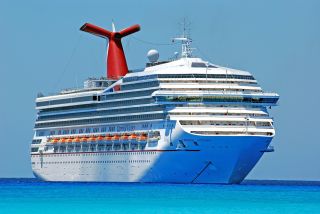Alcoholism
How to Enjoy a Cruise Without Shipwrecking Your Recovery
Tips for wise planning, support, and relapse prevention.
Updated August 23, 2023 Reviewed by Ray Parker
Key points
- Over-drinking is common on cruises, even for those who don’t struggle with substance use disorders.
- Those with substance use disorders in early recovery may be at increased risk of relapse on a cruise.
- The risk of relapse can be mitigated with good planning and preparation.

One of my clients in substance use treatment, after nine months of sobriety and recovery, experienced a spectacularly awful relapse on a cruise ship.
Despite weeks of discussing how to protect her hard-won sobriety, total immersion in the cruise culture of constant imbibing proved too much for her. She fell and injured herself, embarrassing herself in front of colleagues, and putting her job at risk.
Fortunately, this brave client was able to quickly get her recovery back on track. Her case taught me much about what I would do differently the next time I encounter someone facing this situation.
Drinking alcohol is the norm in most social situations in our culture, but the peer pressure to drink escalates when on vacation. On a cruise, many drinkers can’t imagine abstaining from a fruity cocktail at the poolside, a glass of champagne at sunset, or a few rounds of margaritas on a shore excursion. Some find it a “buzz kill” if others at the party don’t wish to drink with them.
Cruise ships offer an unlimited quantity and variety of food and drink day and night. Typical package deals entitle each cruiser to up to 15 alcoholic drinks per day for a fixed, prepaid price, including tips. There is no impediment, financial or otherwise, to start drinking in the morning and continue into the night. Cruisers who drink in moderation at home drink almost eight times more on average while cruising.
Given this alcohol-drenched environment, is it safe for a person with substance use disorder in early recovery to take a cruise? As in any environment, those in recovery are entirely responsible for their sobriety while on vacation.
If this applies to you, it is wise to consider how you will respond if the temptation to drink increases when you are separated from your typical routines and support systems.
How can you enjoy yourself without shipwrecking your recovery? Thankfully, veteran sober travelers attest that it can be done with good preparation and planning before you embark. Here are some tips.
Before you commit to a cruise:
- First, honestly evaluate the strength of your recovery. Do this with a therapist, a sponsor, or an impartial friend who understands you and your triggers well.
- Consider the length of your sobriety, any slips or relapses you’ve had, your support system, your overall mental health, and your current stressors.
- Discuss your most common and potent triggers to drink, and how you cope with cravings.
- If you are in early recovery and at high risk of relapse, consider postponing the cruise or finding one where there is no alcohol present. If that doesn’t work for your traveling companions, you may have to put your sobriety first and miss this one.
- An online search will link you to companies that offer sober cruises, which can be a great option. These companies cater to the recovery community, either scheduling entirely alcohol-free cruises or doing special bookings on a ship where alcohol is available. Either way, the cohort of sober passengers support each other’s abstinence, take meals together, and attend sober activities. This option is worth investigating if some of your traveling companions wish to drink, but you need strong guardrails for your sobriety. No one has to miss out on the vacation they desire.
If your recovery is strong:
You may be able to handle immersion in the general population of cruisers, with some planning.
- Store in your phone the numbers of 2-3 people who commit to be available to you, day or night, to help you if you start to have cravings while cruising. Preferably, at least one of them is with you as a “sober buddy.”
- Bring all of the coping tools you have used successfully at home. If prayer and meditation are daily practices, continue them. Exercise daily. Get a massage. Do relaxation exercises, write, breathe, employ positive self-talk, listen to music, or read recovery literature. Use sensory distractions to counteract cravings.
- Always keep water with you. This keeps you hydrated without having to order a drink at the bar. It also gives you an easy out when someone offers you a drink: “I have my water, thank you.” Or, if you want something more festive, consider a “mocktail,” as long as this doesn’t trigger you to crave the “real thing.”
- Inquire about “Friends of Bill W.” or “F.O.B.” Nearly every cruise company discreetly offers support meetings with this designation. There are bound to be dozens of others like you who want to stay on track. Make some new sober friends.
While onboard:
- Remember how much drinking has cost you in the past, and why you made the wise decision to pursue recovery. Don’t succumb to the old lie that you can’t have fun without alcohol.
- There is a vast array of entertainment, games, recreation, and excursions available to you. Choose some you can thoroughly enjoy without drinking. Strive to have lots of fun with no regrets.
- Avoid spending time with people, even family members, who don’t respect your commitment to sobriety. Cruise ships are huge, so you may choose to keep some space between you and them. People who truly care about you will respect and support your sobriety.
If you have a slip:
- Use the above resources and tools to get back on track as quickly as possible and steer away from a full-blown relapse.
- Don’t be too hard on yourself. Slips are very common in the recovery process. Admit the slip to those in your support system, receive encouragement, recommit, and start again.
Happy cruising: Make some sober memories, and then return home to encourage others in recovery with your success story.
References
Faulkner, Brooke (2018). How Much Alcohol Do People Drink on Cruise Ships?


